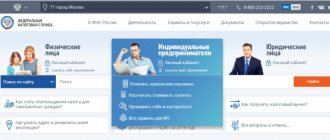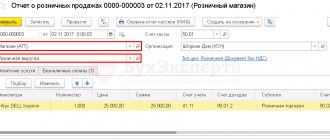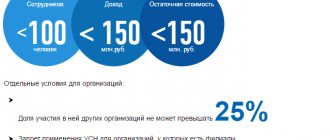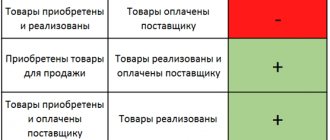Revenue under the simplified tax system for 2020–2021
One of the main requirements regarding the possibility of using the simplified tax system by a company or individual entrepreneur is the established limit on the level of annual income, which should not exceed 150 million rubles.
(clause 4 of article 346.13 of the Tax Code of the Russian Federation). From 2021, income limits are increasing. Find out how the limits will change from 2021 by studying the explanations of ConsultantPlus experts. If you do not have access to the K+ system, get a trial online access for free.
The procedure for accounting for income under the simplified tax system is determined by Art. 346.15, 346.17 Tax Code of the Russian Federation. Regarding their composition, paragraph 1 of Art. 346.15 refers to sec. 1 and 2 tbsp. 248 Tax Code of the Russian Federation. According to the text of these paragraphs, the amount of income under the simplified tax system is formed by the sum of income:
- from implementation;
- non-operating;
- from gratuitously received property or rights to it.
Income does not include receipts listed in Art. 251 Tax Code of the Russian Federation.
Revenue consists of sales (subclause 1, clause 1, article 248 of the Tax Code of the Russian Federation):
- manufactured products;
- work or services performed;
- previously purchased goods;
- property rights.
In the case of intermediary activities, income will be a commission or other remuneration (see, for example, letter of the Ministry of Finance of Russia dated April 18, 2018 No. 03-11-11/25816).
For the simplified tax system, income is recorded using the cash method (Article 346.17 of the Tax Code of the Russian Federation), which presupposes the actual receipt of money to the current account/cash, as well as the receipt of other property (work, services) and (or) property rights, repayment of debt (payment) in a different way.
For more information about the conditions that allow you to apply the simplified tax system, read the article “Procedure for applying the simplified taxation system” .
The procedure for reflecting non-operating income and expenses in accounting and tax accounting
The goal of any organization is to make a profit. Profits can be divided into two categories:
- Sales income is received from the sale of goods and services;
- Non-operating income is income that is not related to the main area of activity of the enterprise.
Also, each organization suffers losses that do not relate to the main area of activity. Therefore, non-operating expenses are expenses not associated with the production of goods or the sale of goods and (or) services.
The composition of income and expenses for accounting purposes is specified in PBU 9/99 and 10/99. The procedure for accounting for income and expenses for the purpose of forming the tax base is indicated in Chapter. 25 Art. 250 and Art. 265 of the Tax Code of the Russian Federation.
Financial data for account 91 shows the amount of other income and expenses. Account 91.01 is used to account for non-operating income, and account 91.02 is used to account for non-operating expenses.
Non-operating income simplified
Such income includes, for example, received (Article 250 of the Tax Code of the Russian Federation):
- from leasing property;
- from the transfer of intellectual property rights for use;
- in the form of interest on loan agreements or bank deposits;
- when receiving property free of charge;
If a simplifier received property for free use for his entrepreneurial activity, for example, real estate or a vehicle, does income arise? If so, in what order to determine its size? K+ system experts gave detailed instructions on this situation, based on explanations from officials and courts. Get a free trial of K+ and explore authoritative opinions.
- in the form of fines from counterparties for violation of the terms of the contract, including received compensation for legal expenses ;
- as income from previous years;
- in the form of surpluses identified during inventory ( how to take them into account, see more here );
- when writing off accounts payable;
- from participation in other organizations;
- like exchange rate differences;
- as compensation for self-demolition of unauthorized buildings, etc.
Read more about the composition of non-operating income in this material.
Let's look at some examples from the list above.
Rent
When leasing property from a simplified tenant, there may be not only income in the form of rent, but also income:
- in the form of tenant payments for utilities related to the leased property (letters of the Ministry of Finance dated 04/18/2018 No. 03-11-11/25816, dated 05/22/2017 No. 03-11-06/2/31137, dated 09/04/2013 No. 03-11-11/36391);
- in the form of inseparable improvements to the leased property made by the tenant without the consent of the landlord (letter of the Ministry of Finance dated 09.09.2013 No. 03-11-06/2/36986).
The lessor may include in his expenses the costs of maintaining the property being leased. More details about this can be found in the article “Can a lessor take into account the costs of maintaining a rental property for the simplified tax system?” .
Accounts payable
Accounts payable can be written off after the statute of limitations expires. Then these amounts are recognized as income. This is allowed if they do not fall under the requirements of subsection. 21 clause 1 art. 251 of the Tax Code of the Russian Federation (see letter of the Ministry of Finance of Russia dated 08/07/2013 No. 03-11-06/2/31883).
Fines
Contractors who violate the terms of concluded contracts pay fines. These amounts are also included in income when they are credited to a current account or cash register.
Amounts accrued to counterparties in court are not taken into account in income until they are paid (letter of the Ministry of Finance dated July 1, 2013 No. 03-11-06/2/24984). If a court decision was made to compensate the simplifier for damages, then he will receive income not after this decision is made, but when the money is credited to the current account or cash register.
Income from deposits, contributions to the authorized capital, reimbursement of expenses from the Social Insurance Fund, refund of state duties, membership fees, etc. - are such receipts considered taxpayer income under the simplified tax system? The nuances of taxation of such income were considered by ConsultantPlus experts. Study the material by getting trial demo access to the legal reference system. It's free.
Accounting press and publications
“Simplified”, 2007, N 2
ACCOUNTING FOR NON-OPERATING INCOME
When working under a simplified system, the main part of the proceeds is, of course, income from sales, which forces us to treat them very carefully. However, accounting for non-operating income is no less important: although the company encounters each of them much less frequently than sales revenue, together they form a fairly large group, and a significant amount can accumulate.
In accordance with the provisions of Art. 346.15 of the Tax Code of the Russian Federation, using a simplified system, organizations and individual entrepreneurs include income from sales and non-operating income in the tax base. The first ones have been studied by us to one degree or another - we often discussed them, but the others were considered only occasionally. Now let's take a closer look at them.
Compound
All companies take into account non-operating income, guided by the list of Art. 250 Tax Code of the Russian Federation. Before talking about errors, let's consider the types of these incomes and find out which of them can arise under a simplified system.
1. Income from equity participation in other organizations, or dividends. They can appear in anyone, including those who use “simplified language”. We only note that the indicated amounts are not included in taxable income if the tax has already been withheld from them by the tax agent (Article 346.15 of the Tax Code of the Russian Federation).
2. Exchange rate difference (positive or negative), which is formed when buying and selling currency at a rate different from the rate of the Central Bank of the Russian Federation. With any accounting method - whether it is carried out in full or only for fixed assets and tangible assets - “simplified” must also count it.
3. Fines, penalties, etc. recognized by the debtor or subject to payment by court decision. They are related to “simplified” provided that they are not just recognized, but actually received (clause 1 of Article 346.17 of the Tax Code of the Russian Federation).
4. Income from the rental of property. Legal income of any organization, regardless of the taxation system. True, if leasing property is the main activity, then revenues are taken into account under another article - as income from sales (Article 249 of the Tax Code of the Russian Federation).
5. Income from the transfer of rights to the results of intellectual activity and equivalent means of individualization (rights confirmed by patents for inventions, industrial designs and other types of intellectual property). As with leasing, if a company specializes in providing rights, for it we are already talking about income from sales. All this fully applies to the simplified tax system.
6. Interest received on loans and borrowings. Credit organizations cannot apply a special regime (clause 2, clause 3, article 346.12 of the Tax Code of the Russian Federation). But everyone has the right to issue loans. Therefore, those working under the simplified system may have interest income, but only from loans.
7. Recovered reserves. “Simplers” recognize only paid expenses and have no reserves. Therefore, this type of income is not typical for them.
8. The cost of property received free of charge. Gifts supplement the income of each company.
9. Income of participants of a simple partnership. Among them there may well be “simplifiers”.
10. Income of previous years identified in the reporting period. “Simplers” do not have such, since they take into account income immediately, at the time of receipt.
11 and 11.1. Exchange and amount differences. The former arise from the revaluation of cash and other property, the latter - from claims expressed in foreign currency. Firms that use a simplified system have both.
12. Income from nuclear power plants due to the free transfer of fixed assets and intangible assets to them under special agreements. Naturally, the “simplification” does not apply to nuclear energy facilities in any way.
13. The cost of materials or other property received during the dismantling of fixed assets being decommissioned. This process, and therefore income, is possible for any organization.
14. Targeted funds used for other purposes. “Simplers” are not required to reflect the target amounts at the time of receipt (Clause 14, Clause 1, Article 251 of the Tax Code of the Russian Federation), however, having spent them at their own discretion, they must enter them into the tax base.
15. Income generated in the presence of radiation and nuclear hazardous industries and facilities, when special reserves are used for other purposes. This point does not apply to “simplistic” ones.
16. Amounts waived by shareholders (participants) when reducing the authorized capital. This type of income is possible for any organization, regardless of the taxation regime.
17. Contributions or deposits returned by a non-profit organization. They are included in income if they were previously accounted for as expenses. However, the indicated amounts are not expenses of the simplified people; therefore, this type of income is excluded for them.
18. Accounts payable written off due to the statute of limitations or not repaid for other reasons. Under the simplified tax system, it is recognized as income, as under all other tax regimes.
19. Income from operations with financial instruments of futures transactions (with securities). Professional participants in this sector of the market do not use the simplified system, so such income is not possible with it.
Note. This is stated in paragraphs. 6 clause 3 art. 346.12 Tax Code of the Russian Federation.
20. The cost of surplus inventories and other property identified during the inventory. Inventory is an integral part of the accounting of any company, therefore, the corresponding income is also characteristic of the simplified tax system.
21. The cost of media and book publishing products replaced upon return or written off on the basis of paragraphs. 43 and 44 paragraph 1 art. 264 Tax Code of the Russian Federation. Organizations under the general regime have the right to take into account in the income tax base the cost of printed products that are defective, have lost their marketability, or are not sold on time. If we proceed from paragraph 1 of Art. 346.16 of the Tax Code of the Russian Federation, with “simplification” there are no such expenses. But, unfortunately, there is income. This is confirmed by Letter of the Ministry of Finance of Russia dated August 31, 2006 N 03-11-04/2/180. The issue is still controversial, since the Code states that income is taken into account while expenses are written off at the same time. But, as always, companies that do not agree with the generally accepted position will have to defend their views in court.
On a note. Do organizations consider material benefits?
It is known that interest-free loans or loans received on the condition of interest below 3/4 of the refinancing rate from individuals are considered a material benefit and are subject to personal income tax.
What will happen in a similar case with organizations? Fortunately, they do not generate taxable income. Why? Because it does not require organizations to take into account loans received. 26.2, dedicated to the simplified system, nor Ch. 25 of the Tax Code of the Russian Federation on income tax (this conclusion is given in the Letter of the Federal Tax Service of Russia for Moscow dated December 23, 2005 N 20-12/95315).
Accounting errors
Knowing what kind of non-operating income you can encounter with “simplification,” let’s move on to the most common mistakes.
Amounts received from penalties
All penalties and fines paid by counterparties are recognized as non-operating income. Let's consider two error options.
Example 1. Sfera LLC sells food products using the simplified tax system (the object of taxation is income). At the beginning of 2007, a consignment of goods was delivered to the buyer. According to the terms of the agreement, he undertook to pay it no later than January 31. However, the required amount is 850,400 rubles. — arrived only on February 12. As a result, the buyer was charged a penalty of 8,164 rubles, which he transferred on February 16. The company's accountant included only the cost of delivery in February income. Did the accountant do the right thing?
The income of “simplified” residents is taken into account when funds are received (clause 1 of Article 346.17 of the Tax Code of the Russian Federation). Consequently, both amounts should be included in February income: 850,400 rubles. (February 12) and 8164 rub. (February 16). Due to the fact that penalties were not taken into account, the tax base decreased by 8,164 rubles, and the single tax was underpaid by 490 rubles. (RUB 8,164 x 6%).
Example 2. CJSC Smena is renovating premises. The tax system is simplified, with the object of taxation being income minus expenses. One of the customers violated contractual obligations by not paying for services on time. He was charged with penalties in the amount of 135,800 rubles, but he refused to pay it. Then the company filed a lawsuit, which, by a resolution dated January 26, 2007, decided the case in its favor. The customer transferred the fine on February 12. Did the accountant at Smena CJSC do the right thing by recording RUB 135,800? in the Income and Expense Book on January 26?
Indeed, the amounts due to the company on the basis of a court decision for a partner’s violation of the terms of the contract are in paragraph 3 of Art. 250 of the Tax Code of the Russian Federation are indicated as non-operating income. But we must not forget that according to paragraph 1 of Art. 346.17 of the Tax Code of the Russian Federation, “simplers” account for their income on a cash basis, that is, only after receiving money or other property. Consequently, it was clearly premature to reflect the amount of the fine on January 26. As a result, the company's tax base for January became overestimated by 135,800 rubles, and for February - underestimated. January and February are included in the same reporting period - the first quarter, so the error did not affect the tax, although this in no way justifies a deviation from the rules for accounting for income and expenses.
Interest on the loan agreement
Most often, errors are caused by the fact that amounts received from interest are reflected untimely or not reflected at all. However, there are also less obvious errors.
Example 3. Quorum LLC applies the simplified tax system (the object of taxation is income). In January 2007, the company issued a loan in the amount of 1,200,300 rubles. at 15% per annum. In February, the borrower transferred interest for 30 days in the amount of RUB 14,798. The accountant considered that only amounts exceeding those calculated at the rate of the Central Bank of the Russian Federation multiplied by 1.1 should be taken into account in income. The tax base of the company included non-operating income in the amount of 2861 rubles. (RUB 14,798 - RUB 1,200,300 x 11% x 1.1: 365 days x 30 days). Is this really how it should be?
There was some confusion. These accepted expenses for paying interest on credits (borrowings) are limited by the rate of the Central Bank of the Russian Federation, multiplied by 1.1 (if such a method is specified by the accounting policy). The entire amount of interest must be reflected in the lender's non-operating income. Therefore, in our case, in February it was supposed to take into account not 2861, but 14,798 rubles. Because of this, the tax base of Quorum LLC turned out to be underestimated by 11,937 rubles. (14,798 rubles - 2861 rubles), and if the error is not corrected by the end of the quarter, the tax will be 716 rubles. (RUB 11,937 x 6%) is less than required.
Note. About this - in Art. 269 of the Tax Code of the Russian Federation, to which there is a link in paragraph 2 of Art. 346.16 Tax Code of the Russian Federation.
Rental income
Despite the fact that we have dwelled on this type of non-operating income more than once, readers still have many questions.
First of all, we note that there are no special differences in tax accounting, depending on whether leasing is the main activity of the company. Simply, as already mentioned in the first section of the article, if rent is the main source of subsistence, income from it is considered income from sales, and if it is a side income, non-operating income. But they reflect the same.
What mistakes are there? Well, first of all, the usual ones: amounts are not included in the tax base or are taken into account in the wrong number. Secondly, only the payment for the rent itself is entered into the Income and Expense Book. But you also need to take into account the payment of utilities, and it makes no difference whether the tenant reimburses expenses to the landlord or transfers money directly to specialized services. The exception is when contracts with these services are concluded on behalf of the tenant.
Example 4. Floria LLC applies the simplified tax system with the object of taxation being income minus expenses. The main activity is retail trade. In addition, in January 2007, the company began leasing part of its retail space. In February, 126,900 rubles were received for this. The company sent letters to its tenants demanding that they pay the debt for utilities, and the tenants also transferred 75,300 rubles to the utility accounts in February. However, they did not notify their landlord about this. How should an accountant at Floria LLC act in such circumstances?
According to the opinion of the Ministry of Finance, expressed in some Letters (for example, dated 08/16/2005 N 03-11-04/2/48 and dated 02/02/2005 N 03-03-02-04/2/2), the amount for “utilities” including those transferred by tenants to the accounts of service organizations, the tenant must take into account in income. And the fact that the landlord was not informed about the transfers is not an excuse. The accountant is obliged to inquire about this issue and ask to send copies of payments. So, in the tax base of Floria LLC you need to reflect 126,900 and 75,300 rubles. If the second amount is not taken into account, the single tax will be charged on 11,295 rubles. (RUB 75,300 x 15%) less.
By the way, errors are possible not only in tax accounting, but also in accounting, if, of course, the company maintains it in full using a simplified system. It must be remembered that if leasing property is not the main activity, then revenues are recorded in account 91-1 “Other income”, respectively, expenses associated with the provision of rental services are recorded in account 91-2 “Other expenses”. It would be incorrect to use account 90 “Sales” in this situation.
Accounts payable
Let us remind you that unclaimed accounts payable are subject to write-off when:
1) the company of the debtor or creditor has been liquidated;
2) the statute of limitations has expired.
This is where the most common errors occur. The fact is that “simplified people” determine income using the cash method (clause 1 of Article 346.17 of the Tax Code of the Russian Federation), and income, as we are accustomed to understanding, represents cash or property. When writing off accounts payable, it seems that neither one nor the other is received, so some accountants forget to reflect it. But in vain. After all, in paragraph 1 of Art. 346.17 of the Tax Code of the Russian Federation states that income arises when receiving money, property, as well as when repaying debts in another way. So, writing off unclaimed accounts payable is this other method. Non-operating income that appears is reflected in the Income and Expense Book on the day of write-off, that is, when the corresponding document was drawn up (for example, an accounting certificate).
Example 5. CJSC Pleiada applies a simplified system (the object of taxation is income) and maintains accounting in full. As of February 1, 2007, the company had accounts payable to the supplier in the amount of RUB 124,300. However, it turned out that the supplier company was liquidated on February 20. Based on a copy of the liquidation certificate, the debt was written off in the accounting records, but was not reflected in the tax records. What will this affect?
A common mistake is that the accountant did not take into account written-off accounts payable in non-operating income.
The written off accounts payable should have gone into the Income and Expenses Accounting Book (see table).
Table. Fragment of the Book of Income and Expenses
JSC "Pleiada"
————T—————————————T————————————————T—————————— ————T——————————————¬ | N |Date and number | Contents | Income, | Expenses, | |p/p| primary | operations | taken into account | taken into account | | | document | |when calculating|when calculating| | | | |tax base|tax base| +———+—————————————+————————————————+—————————————— +——————————————+ | 1 | 2 | 3 | 4 | 5 | +———+—————————————+————————————————+—————————————— +——————————————+ |…| ... | ... | ... | ... | +———+—————————————+————————————————+—————————————— +——————————————+ | 57|Accounting|Written off | 124 300 | — | | |certificate N 37 |unclaimed| | | | |from 02/20/2007|creditor | | | | | |debt | | | +———+—————————————+————————————————+—————————————— +——————————————+ |…| ... | ... | ... | ... | L———+—————————————+————————————————+—————————————— +——————————————— Due to an error, the tax base of Pleiada CJSC was underestimated by 124,300 rubles, and the tax by 7,458 rubles. (RUB 124,300 x 6%). On a note. And in accounting there are no more non-operating incomes. Order of the Ministry of Finance of Russia dated September 18, 2006 N 116n introduced changes to PBU 9/99 “Income of the organization”, which will need to be followed starting with reporting for the past year. Now there are no more such incomes as non-operating and operating income. This will certainly make the accountant’s work easier - he won’t have to rack his brains about what to include in which group. In accounting there will only be two types of income: from ordinary activities, as before, and others, that is, all the rest. L.A. Maslennikova K. e. Sc., expert of the magazine “Simplified” Signed for publication on January 17, 2007 ————
The procedure for recognizing income under the simplified tax system
Under the simplified tax system, income is recognized (Article 346.17 of the Tax Code of the Russian Federation) at the moment:
- receiving payment from the buyer to a bank account or to the cash register;
See also “What date should the principal recognize income on the simplified tax system?” .
- receipt (free of charge or as payment) of property (or rights to it), work, services;
- receiving advances for the subsequent transfer of goods;
- payment by bill of exchange;
- payment by check;
- payments through electronic payment systems.
The day the money is received is the date for recording the income received. Moreover, it does not matter whether the goods have been shipped, the work has been completed or not. Receipt can be payment of both debt and advance payment.
Income is also recognized as the offset of debts of organizations among themselves for the amount of the repaid obligation (letter of the Ministry of Finance dated September 23, 2013 No. 03-11-06/2/39230).
When paying for goods with a bill of exchange, the date of receipt of income will depend on the method of its sale. When submitting a bill of exchange for payment to the bank, the receipt of money in the company's current account will be considered the day the income is received.
You can also pay with a bill of exchange with another supplier. In this case, a transfer signature (endorsement) is filled in on the bill, i.e. the right to the bill passes to another person. The date of transfer of the bill will be the day the income is received on it (see letter of the Ministry of Finance of the Russian Federation dated February 20, 2016 No. 03-11-06/2/9917).
If an organization using the simplified tax system received a check from the buyer as payment, it can count the income on it if the following conditions are met:
- crediting money to the seller's account when submitting the check to the bank;
- receiving cash by check;
- transfer of a check to a third party.
The date of receipt of income on the check will be the day the money is received in the current account or cash register. When transferring a check under a deed to a third party, the day the income is credited will be the date of the executed transfer deed.
When making payments through electronic payment systems (Clause 10, Article 7 of the Law “On the National Payment System” dated June 27, 2011 No. 161-FZ), the date of payment is considered to be the simultaneous performance of the actions of the system operator:
- acceptance of electronic funds from the client;
- reduction of balances on his account;
- increasing them in the recipient's account by the same amount.
The supporting document in this case is an extract or message from the payment system operator.
Let's consider the payment method through ATMs. If the housing management company (HMC) collects fees for utilities using the simplified tax system, then payment for them can be made through ATMs. In this case, the UZhK enters into an agreement with the payment agent to accept payments and their subsequent crediting to the UZhK's current account for a fee. The date of receipt of income from the UZHK will be the day the money is received from an individual to the paying agent (clause 3 of Article 3 of the Law “On activities for accepting payments from individuals carried out by payment agents” dated 06/03/2009 No. 103-FZ). This date can be determined based on the payment register compiled by the payment agent.
Examples of income under the simplified tax system
So, under the simplified tax system, income and expenses are calculated using the cash method. Money received into a current account or cash register is considered income.
Some examples of income taken into account under the simplified tax system are given above. In addition, income taken into account under the simplified tax system may arise in other situations.
For example:
- An organization using the simplified tax system repays a previously received loan with its property. When property is transferred, ownership of it is transferred to the creditor, and therefore, the debtor receives income from the sale of this property. This income is taken into account when calculating the tax base according to the simplified tax system (Article 409 of the Civil Code of the Russian Federation, Article 38, paragraph 1 of Article 39, Articles 248, 249, 346.15 of the Tax Code of the Russian Federation, letter of the Ministry of Finance of the Russian Federation dated June 28, 2016 No. 03-11-11 /37751).
- “Simpler”, in accordance with the state-approved program for promoting self-employment of unemployed citizens and stimulating the creation of additional jobs for unemployed citizens by unemployed citizens who have opened their own businesses, receives payments from the budget. Payments received must be reflected in income, but not on the day they are received in the current account, but on the date when the amount received is spent in accordance with the conditions for receiving budget funds. Income from payments received is recognized in the amount of amounts spent. This procedure applies for 3 tax periods. If, at the end of the 3rd period, the simplified person has unspent amounts of payments received for the above purposes, then the remaining amounts will need to be included in income for the purposes of calculating the simplified tax system. If a “simplified” person violates the conditions for receiving budget funds, then the entire amount of payments received will need to be included in income subject to simplified tax (paragraphs 4, 5, paragraph 1, article 346.17 of the Tax Code of the Russian Federation).
- “Simpler”, as a small business entity, can receive financial support in the form of budget subsidies. Subsidies received are reflected in income in proportion to the actual expenses incurred due to them, but not more than 2 tax periods from the date of their receipt. If, at the end of the second tax period, the amount of subsidies received exceeds the amount of funds spent and recognized as expenses, this difference should be reflected in income in this tax period.
USN and UTII. How to take into account non-operating income
Our company received, under a free use agreement, premises for trading in book goods. For retail trade we use UTII, for wholesale trade we use the simplified tax system (income minus expenses).
According to paragraph 8 of Art. 250 of the Tax Code of the Russian Federation, income in the form of a gratuitously received right to use property is non-operating income and is subject to income tax or a single tax paid in connection with the application of the simplified tax system. Should we pay a single tax when applying the simplified tax system on non-operating income from all types of activities or only on wholesale trade income, distributing it in proportion to revenue?
In accordance with paragraph 1 of Art. 346.15 Tax Code of the Russian Federation
organizations applying the simplified taxation system, when determining the object of taxation, take into account income from the sale of goods (work, services), sale of property and property rights, determined in accordance with
Art.
249 of the Tax Code of the Russian Federation , and non-operating income determined in accordance with
Art.
250 Tax Code of the Russian Federation .
Income in the form of gratuitously received property rights (including the right to use property) is subject to inclusion in the non-operating income of the borrower on the basis of clause 8 of Art. 250 Tax Code of the Russian Federation
.
Consequently, this income is taken into account when determining the tax base for the single tax.
Clause 8 art. 346.18 Tax Code of the Russian Federation
It has been established that single tax payers under the simplified tax system, transferred for certain types of activities to pay a single tax on imputed income for certain types of activities, keep separate records of income and expenses under different special tax regimes.
If it is not possible to share expenses
when calculating the tax base for taxes calculated under different special tax regimes, these expenses are distributed in proportion to the shares of income in the total amount of income received when applying the specified special tax regimes.
At the same time, according to paragraph 7 of Art. 346.26 Tax Code of the Russian Federation
Taxpayers who, along with business activities subject to a single tax on imputed income, carry out other types of business activities are required to keep separate records of property, liabilities and business transactions in relation to business activities subject to a single tax and business activities in respect of which taxpayers pay taxes in accordance with a different taxation regime (including the simplified tax system).
In 2006, the Ministry of Finance explained that if an organization only
are not subject to
taxes under the general taxation regime (letter dated November 27, 2006 No. 03-11-04/3/506).
However, after several months, officials changed their minds and in a letter dated August 15, 2007 No. 03-11-04/3/324 indicated that when carrying out business activities subject to a single tax on imputed income, the economic benefit
organization in the form of a property right to property received for free use is subject to
income tax
(or, accordingly,
a single tax
when applying the simplified tax system).
If an organization combines two tax regimes
and it is impossible to determine whether non-operating income belongs to the type of activity transferred to the payment of a single tax on imputed income, then, in the opinion of the Ministry of Finance, these non-operating income should be taken into account in the tax base for income tax or for a single tax under the simplified tax system.
In letter No. 03-03-01-04/1/116 dated March 15, 2005, officials noted that Chapter 25 of the Tax Code of the Russian Federation does not contain a mechanism for distributing non-operating income between types of activities to which different tax regimes apply.
Cost sharing mechanism
yes,
clause 9 of Art.
274 of the Tax Code of the Russian Federation , according to which the expenses of organizations that have switched to paying a single tax on imputed income, if it is impossible to separate expenses, are determined in proportion to the share of the organization’s income from activities related to the payment of tax on imputed income in the total income of the organization for all types of activities.
And for the “simplified people”, the mechanism for distributing expenses
established
by clause 8 of Art.
346.18 Tax Code of the Russian Federation .
And just as in the case of UTII, it is not established
mechanism for distribution of non-operating
income
.
Therefore, if an organization cannot specifically determine whether non-operating income belongs to a type of activity subject to a single tax under the simplified tax system or UTII (as in your case), then the entire amount of non-operating income should be included in the tax base under the single tax under the simplified tax system.
Although even if you could determine whether non-operating income belongs to the activity transferred to the payment of UTII, taking into account the current position of the Ministry of Finance, you would still have to take into account the amount of income as part of income under the simplified tax system.
Income not taken into account under the simplified tax system
These include income reflected in Art. 251 Tax Code of the Russian Federation. In particular, these may be:
- deposit or deposit received;
- property accepted as a contribution to the authorized capital;
- funds received by the agent to carry out the assignment assigned to him.
Taxation also does not take into account income in the form of:
- returned deposit;
- money received from the supplier for defective goods returned to him;
- money returned due to incorrectly specified details;
- return of erroneously transferred amounts;
- funds from the Social Insurance Fund to reimburse expenses for disability and maternity benefits;
- refund of overpaid taxes and contributions;
- returned advance.
Find out what income does not need to be included in the tax base for the “simplified” tax in the Ready-made solution from ConsultantPlus. Get a free trial of K+ and learn what K+ experts say.
Results
Income under the simplified tax system recognizes income from sales and non-operating income, with the exception of the income given in Art.
251 NKRF. The moment of recognition of income is recognized as their actual receipt. In the special order described in paragraph 1 of Art. 346.17 of the Tax Code of the Russian Federation, income received in the form of budget subsidies for the development of small businesses and in the form of payments from the budget aimed at reducing unemployment is recognized. You can find more complete information on the topic in ConsultantPlus. Free trial access to the system for 2 days.







